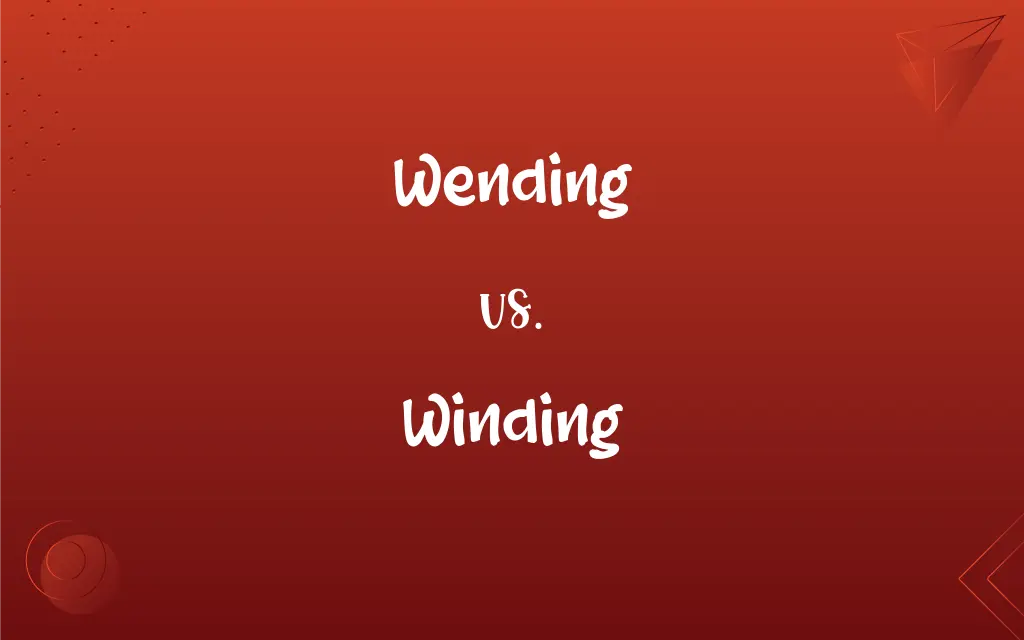Wending vs. Winding: What's the Difference?
Edited by Janet White || By Harlon Moss || Updated on November 2, 2023
Wending means to go in a specified direction, typically slowly; winding means to follow a twisty or spiral course.

Key Differences
Wending and winding are both verbs that describe types of movement. Wending carries the connotation of a leisurely or meandering journey towards a destination. Winding, on the other hand, specifically refers to a path or course that bends in curves or turns.
The term wending is less commonly used and has an old-fashioned or literary tone to it. It suggests a purposeful, often unhurried progress. Winding is more common and can refer to both movement along a curved path and the action of coiling something around.
Wending is seldom used in the context of objects, focusing mainly on the action of people or animals moving. Winding can be applied to both animate and inanimate subjects, such as a road winding through the mountains or winding a watch.
In terms of usage, 'wending one's way' is a fixed phrase that encapsulates the idea of traveling with intention, though not necessarily with urgency. Winding can be used more flexibly to describe the shape of things, the action of wrapping, or the general course of something moving along a non-linear path.
Wending typically doesn’t imply repetition, while winding can. Wending is just about direction. Winding might involve looping or circling back, like winding a thread around a spool or a river winding through a valley.
ADVERTISEMENT
Comparison Chart
Part of Speech
Verb
Verb
Connotation
Leisurely travel, often figurative
Twisting path or action, often literal
Usage
Primarily with animate subjects
Applies to both animate and inanimate subjects
Frequency
Less common, literary or archaic feel
More common, everyday usage
Implication of Action
Movement towards a destination, not repetitive
Can imply a repetitive or coiling motion
ADVERTISEMENT
Wending and Winding Definitions
Wending
To proceed along a course or route.
They were wending through the narrow streets of the old city.
Winding
To follow a course that is not straight or flat.
The road was winding up the mountain, making her feel dizzy.
Wending
To go slowly with a meandering motion.
The tourists were wending down the trail, taking in all the sights.
Winding
To wrap something around an object.
She was winding the yarn into a ball.
Wending
To move in a specified direction.
After the concert, everyone was wending toward the subway.
Winding
To turn or twist something repeatedly.
He was winding his watch to make sure it kept proper time.
Wending
To make one’s way in a quiet, subtle manner.
She was wending her way toward the exit, trying not to attract attention.
Winding
To twist or coil something.
The vine was winding around the tree trunk.
Wending
To embark on a course or way.
He is wending to the market every morning before dawn.
Winding
To make or become twisted together.
The two ropes were winding together so tightly that they seemed as one.
Wending
To proceed on or along; go
Wend one's way home.
Winding
Something wound about a center or an object
An armature with its wire winding.
Wending
To go one's way; proceed.
Winding
The way in which something is wound.
Wending
Present participle of wend
Wending
Act of going, course
Wending
Direction
FAQs
How do you use wending in a sentence?
"After the play, we spent the evening wending our way through the crowded streets of the city."
What does wending mean?
Wending means to go in a specified direction, typically at a leisurely pace.
Can wending be used for inanimate objects?
It's uncommon and usually reserved for animate subjects.
What is a synonym for wending?
Meandering is a close synonym.
Can winding mean coiling?
Yes, like winding a cord around a spool.
What does winding mean?
Winding refers to following a twisty path or coiling something around.
Is winding always physical?
No, it can also be used metaphorically, like "winding one’s way through a problem."
Can winding be used in technical contexts?
Yes, like winding wires in electronics.
Can you use wending metaphorically?
Yes, for example, "wending through life's journey."
Can you give an example of winding in a sentence?
"The river winds through the valley, shaping the landscape."
What is a synonym for winding?
Twisting can be used as a synonym.
Is "wending one's way" a common phrase?
Yes, it's a well-known phrase for going in a certain direction.
Can wending be used in formal writing?
It can, especially for a literary or poetic effect.
Does winding have a directional aspect?
It can, but it's more about the shape of movement than the endpoint.
Is winding a versatile word?
Very much so; it has multiple meanings in different contexts.
Does wending imply speed?
No, it typically suggests a slower, deliberate pace.
What is the past tense of wend?
"Wended," though "went" is also historically used.
What is the past tense of wind?
"Wound."
Is wending a modern English word?
It's considered somewhat archaic but still used in modern English for stylistic effect.
Do winding roads literally wind?
Yes, winding roads twist and turn, following a non-linear path.
About Author
Written by
Harlon MossHarlon is a seasoned quality moderator and accomplished content writer for Difference Wiki. An alumnus of the prestigious University of California, he earned his degree in Computer Science. Leveraging his academic background, Harlon brings a meticulous and informed perspective to his work, ensuring content accuracy and excellence.
Edited by
Janet WhiteJanet White has been an esteemed writer and blogger for Difference Wiki. Holding a Master's degree in Science and Medical Journalism from the prestigious Boston University, she has consistently demonstrated her expertise and passion for her field. When she's not immersed in her work, Janet relishes her time exercising, delving into a good book, and cherishing moments with friends and family.































































